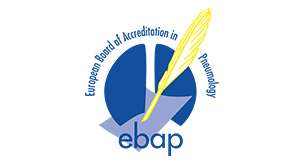The 2026 RFMV programme will be structured around two primary tracks, addressing separately acute and chronic respiratory failure settings.
Additionally, combined sessions will highlight multidisciplinary approaches for diagnosis and treatment of the disease.
Acute topics
- Weaning from invasive ventilation - a multidisciplinary perspective
- How to safely and effectively do VV-ECMO
- Respiratory effort and asynchronies in acute respiratory failure
- The future of acute respiratory distress syndrome (ARDS) management
- Respiratory intermediate care in the post-pandemic era
- Electrical impedance tomography for lung ventilation and perfusion monitoring in adults and children
Chronic topics
- European collaboration in home mechanical ventilation: update on the CRC IMPORTANCE
- Telemedicine and AI for home mechanical ventilation in the near future
- Monitoring of the upper airways during non-invasive ventilation (NIV) and airway clearance
- Diaphragm dysfunction: the role of NIV, pacing and surgery
- Obesity and sleep-disordered breathing: physiology and treatment
- Ethical and sustainable aspects of ventilatory support
- Respiratory support in chronic setting (workshop)
Combined topics
- Applied physiology in acute and chronic respiratory failure
- High-flow therapy in the chronic and acute settings
- Multi-disciplinary care in respiratory failure: role of new drugs or interventions
- Sleep in ICU and in long-term NIV in adults and children
- Monitoring respiratory effort during NIV
- Living with a ventilator: from NIV to tracheostomy
- Assessment of respiratory muscle function (workshop)
- Patient-ventilator asynchronies (PVA) in acute and chronic settings: impact, identification and mitigation (workshop)
Allied health professionals
- Evaluating and treating respiratory muscle dysfunction in patients with weaning difficulties
- Early interventions during mechanical ventilation (workshop)
Session formats
| Symposium | Three or four presentations, including a dedicated time to discussion and Q&A |
| Meet-the-experts | Two keynote talks of 20 minutes and a 20-minute live discussion with the audience |
| Round-table discussions | Informal track-based 60-minute interactive exchanges in small research working groups |
| Year-in-preview | Wrap-up 90-minute session presenting innovations in research - what's coming next? |
| Skills workshops | Two-hour session based on practical training with medical equipment |
| Oral discussion sessions | 5-minute presentations of accepted abstracts/clinical cases to a full room audience |
| Poster sessions | 5-minute presentations of accepted abstracts/clinical cases to a small group led by a topic expert |
Live streaming and replays
Live streaming and session replays will be available to both onsite and online participants. Please note that replays of live streamed sessions will be available within two weeks after the event, in case you are unable to watch the sessions live. Replays will remain accessible until August 2026.
The following sessions will not be live streamed:
- Skills workshops
- Abstract-based (oral discussions, poster and clinical cases) sessions
Accreditation
This event has been accredited with 18.5 CME credits by the European Board for Accreditation in Pneumology (EBAP) and 3 Mark of Excellence CME credits.
The number of CME credits granted for onsite attendance will correspond to your daily in-person presence during the conference. Please note that attendance will be tracked via badge scanning onsite to ensure that you receive the correct amount of CME credits.
The abstract-based sessions and industry-sponsored sessions are excluded from the allocation of CME credits.
Participants registered for online attendance can also claim credits for the hours spent viewing the sessions live. Participants will not accrue credits for watching session replays.



